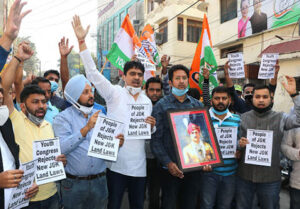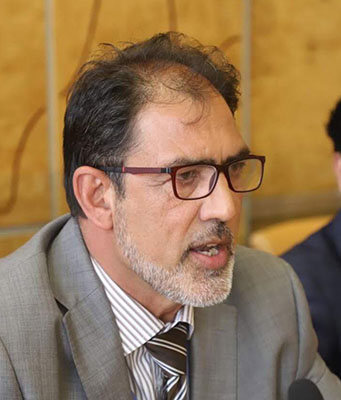Massive human rights abuses, state-sponsored terrorism and denying people the right to decide their future have long been the hallmark of India’s illegal rule in occupied Jammu and Kashmir. Since August 5, 2019’s scrapping of the nominal autonomy this Muslim-majority region enjoyed under the Indian Constitution, the occupation forces have pushed it deeper into a quagmire of reckless violence and lawlessness.
The Kashmir valley in particular has suffered the most in this vicious cycle of violence as the indigenous people are collectively punished through the all-encompassing lockdowns and a sharp spike in incidents of state-terrorism and violence.
Despite the Indian claims of bringing normality to the troubled region, extrajudicial killings, arbitrary arrests and detentions, torture and persecution of leading political activists, traders, dissident journalists, rights activists and members of civil society continue unabated and with impunity.

Since Aug 5, 2019, Indian security forces have killed more than 350 Kashmiris and destroyed around 1008 houses during cordon and search operations in the valley. Out of the 350 killings, 41 were carried out in so-called police custody. Moreover, Indian authorities arrested 14636 civilians in a bid to erase resistance to New Delhi’s decision of merging the disputed Himalayan region into the union territory.
Essential fundamental rights, including freedom of speech, the right to assemble and hold peaceful protest remain suspended in Kashmir. Hundreds of political leaders and activists, including students, have been detained under the draconian laws including the Public Safety Act, Armed Forces Special Powers Act and Unlawful Activities Prevention Act, while notorious investigation agencies such as National Investigation Agency and the Enforcement Directorate are being used as a tool to terrorise NGOs, journalists and human rights activists to prevent them from reporting facts about Kashmir.
Now even the international community — which overwhelmingly ignored state terrorism and human rights abuses in Kashmir in the past, because of India’s economic clout — has been forced to take notice of the situation in the held territory, and has come up with some sharp criticism. Besides, the Office of the High Commissioner for Human Rights (OHCHR) and rights groups from across the world have raised an alarm over the fast deteriorating situation in Jammu & Kashmir (J&K) and have asked the Indian government to stop its gross human rights violations against Kashmiris.
On August 15, 2019 — a week after Indian government revoked Article 370 — Genocide Watch issued a ‘Genocide Alert’ for Kashmir. It called upon the United Nations and its members to warn India against committing genocide in occupied Kashmir. In October 2020, the UN High Commissioner for Human Rights, Michelle Bachelet, voiced concerns over shrinking space for civil society organisations and urged the government of India to protect rights defenders and NGOs.
The Forum for Human Rights in J&K (FHR-JK), an independent body co-chaired by former Supreme Court judge Justice Madan B. Lokur and former Kashmir interlocutor Radha Kumar, in its report, released earlier this year, on the human rights situation in the Indian-Occupied Kashmir (IoK), said that “most violations continued even after 18 months” of abrogation of the special status. The second report of the Forum covered the period from August 2020 to January 2021.

“Two years later, the situation in the restive region continues to deteriorate; there has been no respite, whatsoever, in the state sponsored-violence. The policy of discrimination, denial and dehumanisation, schism, persecution and extermination on the part of the Indian government has led to an immense increase in human rights violations of the civilian population, including harassment, molestation, detention and the use of excessive and indiscriminate force.
On the one hand New Delhi has been using repressive state apparatus to eliminate Kashmiri youth while on the other it unleashed an imperialist plan that seeks to forever change the political nature of the Kashmir dispute through demographic changes, political manoeuvrings, and administrative machinations.”
Along with the abrogation of article 370, the BJP government that believes in Hindu-Rashtra, introduced a regime of new laws in Kashmir intended to; (a) pave a way for implementing its settler colonialist agenda in Kashmir, (b) change the demographic complexion of the Muslim majority state, (c) erase the social, political, cultural and religious identity of the region, (d) convert Muslim majority Jammu and Kashmir into a Hindu majority area, (e) settle outsiders (non-Kashmiris) in the occupied territory, (f) eliminate Islamic culture to erode the foundations of Kashmiri society (g) facilitate a non-Muslim Indian influx into Kashmir.
For this purpose, the Indian government made sweeping changes in the state subject law enforced in Jammu and Kashmir since it was first introduced by the then Maharaja of Kashmir in 1927. Under the new law, anyone who has resided in J&K for 15 years or has studied in the state for seven years, and appeared in either the Class 10 or the Class 12 examination, will be eligible for a domicile certificate. As per the notification, this would allow them to apply for gazetted and non-gazetted government jobs. The amendments in Kashmir’s domicile law are tantamount to opening up the floodgates for non-Kashmiris (Indians) to settle in the disputed territory of Jammu and Kashmir state, which until August last year had enjoyed special status under the Indian constitution.
Redefinition of Domicile Law
Historically, article 35-A that accorded special rights and privileges to the permanent citizens of the state was the only constitutional provision that stood as a barrier against Indian intrigues to bring material change in the region. Without this protection, any Indian national can attain a permanent resident certificate. The law, in a way, paved the way for outsiders to settle in the state permanently, besides enabling them to become claimants of the already existing jobs in Jammu & Kashmir, where the unemployment rate is double that of any other Indian state.
Under the new law, those outsiders who get jobs in the disputed territory of Jammu and Kashmir will also claim the right to purchase land in the state.
Since the day the domicile law was changed, the authorities in Jammu and Kashmir have issued domicile certificates to millions of non-Kashmiris. In February 2021, the Indian Minister of State for Home Affairs, G. Kishan Reddy, in a written reply to a query, informed the Parliament that authorities in Jammu and Kashmir have issued a total of 3,380,234 Domicile Certificates till 25 January, 2021. This huge number of certificates issued in a short period of time speaks volumes about the Indian government’s sinister design to change the region’s demography to achieve its dream of Hindu-Rashtra, a purely Hindu state where there is no place for other communities.
UNHRC Response
The UN Human Rights Commission termed changes in Kashmir’s Domicile Law alarming. In a rapporteur issued by the UN Human Rights Council to the Indian Government on February 10, 2021, the UNHRC noted that these laws have simplified the process of handing out domiciles to subjects from outside the region, with little or no scope of verification, while the minority subjects from the region itself face difficulty.
“The new domicile rules are not only alarming because of the diminishing rights of the natives of the region economically, there are high chances of threat to the linguistic, cultural and religious rights of the Kashmiri Muslim, Dogri, Gojri, Pahari, Sikh, Ladakhi and the other minorities,” the rapporteur said.
Civil Services Act Amendments
The amendment to the J&K Civil Services Act was akin to an assault on the fundamental rights of the people of Jammu and Kashmir. Changing the very composition of the Act was tantamount to rendering Kashmiris jobless. After losing its special status on August 5, 2019, Kashmir has become subject to the 67:33 rule, which means that the share of positions available for Kashmiri Administrative Service officers would be reduced to just 33 percent. Given its special constitutional status, the state of Jammu and Kashmir had earlier enjoyed 70:30 percent quota, under which 70 percent of the seats were allocated to Kashmiri state-subject holders and only 30 percent of seats were reserved for Indian Administrative Service officers who were brought to Kashmir from other Indian states.
Besides providing leverage to the government to tighten its grip on Kashmir, the move changed the entire face of the bureaucracy in Jammu and Kashmir. The effects of the move could be seen on the ground, as most posts in the bureaucracy are now held by outsiders, (non-Kashmiri civil service officers). For instance, Kashmir is ruled by a lieutenant governor, who hails from India’s Uttar Pradesh state. All 13 officers in his secretariat are non-Kashmiris and non-Muslims. The chief of police and two police heads of Kashmir and Jammu provinces are also non-Muslims.
Amendments in Land Laws
Similarly, after the revocation of Kashmir’s autonomy, 12 major land laws, which have been either repealed or amended include the Big Landed Estates Abolition Act-1950, the Jammu and Kashmir Land Grants Act-1960, the Jammu and Kashmir Alienation of Land Act-1938, the Jammu and Kashmir Agrarian Reforms Act-1976 and the Jammu and Kashmir Land Revenue Act-1996.
By introducing massive amendments in these laws the Indian government virtually laid down a foundation for settler-colonialism, as anyone from outside J&K can buy agricultural land with the government’s permission for commercial and other non-agricultural purposes.
The most worrying change has been the amendments in the Jammu and Kashmir Development Act that gave sweeping powers to the Indian Armed forces to declare/notify any piece of land (agricultural or otherwise) in Kashmir as “strategic areas.” By virtue of this law the Indian army can take possession of any land of choice in J&K after declaring it “strategic.”
Further changes to land laws, which dealt exclusively with the sale and purchase of land, have resulted in greater erosion of political and economic rights of the native people. The amendment to the Land Revenue Act, on the other hand, was tantamount to putting Kashmir on sale. “The real object of the repeal of the basic land laws and massive amendments to the other laws are to push in and implement the agenda of effecting demographic change and disempowering the people of Jammu and Kashmir,” said the Gupkar Alliance, an amalgam of “mainstream Kashmiri” political parties.
Changes in the State’s Nomenclature
After the loss of statehood, Jammu and Kashmir, which enjoyed special status under article 370 of the Indian constitution for more than 70 years, has undergone massive political and administrative changes.
The contentious Jammu and Kashmir Reorganization Act, approved by the Indian parliament, became operational on October 31, 2019. As a result, the territory of Jammu and Kashmir under the Indian occupation (IHK) was further bifurcated and demoted to two separate union territories i.e. Jammu and Kashmir and Ladakh. As per the new arrangement, the union territory of Jammu and Kashmir was entitled to have its assembly with truncated powers. On the contrary, the union territory of Ladakh was deprived of this right. Secondly the office of governor was reduced to lieutenant governor; all laws passed by the Indian parliament will be applicable in the region; the Indian Penal Code replaced the local Ranbir Penal Code of Jammu and Kashmir to decide criminal cases. In addition to these drastic changes, over 710 laws were repealed during the course of time in an attempt to further erode the Kashmiris’ political identity.
Before August 5, 2019, the Indian occupied Jammu and Kashmir had its own constitution and a bicameral assembly, a separate constitution and a flag of its own. The state had a separate citizenship law that promised its permanent residents special rights and privileges such as the right to own property; get government jobs; receive scholarships and other welfare benefits. The law seized female citizens of the state of their property rights in case they married a person who was not a permanent citizen of the state. It also prohibited outsiders from permanently settling in Jammu and Kashmir, buying land and holding local government jobs.
Social, Cultural & Religious Onslaught
Along with the land and settler-colonialism policies, Kashmiris have witnessed a social, cultural and religious onslaught. Dismantling everything that symbolised the Kashmiris’ identity, for instance ending Urdu’s 131-year reign as the only official language of Kashmir, including four other languages in the list of official languages and according Hindi the status of official language; changing names of important buildings, roads and historical sites, and rebuilding over 50,000 temples in the Kashmir valley and above all the attempts to change the political structure by wiping out regional parties speaks volumes about the BJP government’s nefarious designs to distort the region’s history and its distinctive identity. These steps taken by the Government of India vis-à-vis the disputed territory of Jammu and Kashmir bear all the hallmarks of a neo-colonialist and imperialistic plan to marginalise Kashmiris, reducing them to a minority and seizing their land and resources.

The writer is Chairman, Kashmir Institute of International Relations (KIIR), Islamabad. He is a member of the All Parties Hurriyat Conference, AJK chapter.




Allah pak ap ko apnay muqasad me qamyaab qaray aur kashmir ko azadi a ta qarain ameen
May Allah bless upon you and grant freedom in our destiny. Amen
A good addition to already done detailed research work on human rights abuses in IOK by the author. Its important to identify and compile HR abuses carried out by Indian security forces in IOK so that international community and various organs of UN can be informed accordingly
Musique Starwars Format Wav Gratuitement
What’s up, I read your blog regularly. Your story-telling style is awesome, keep doing what you’re
doing!